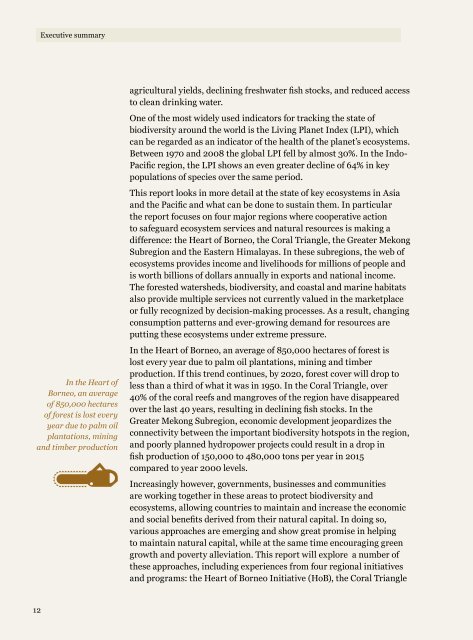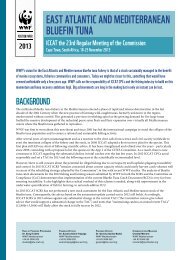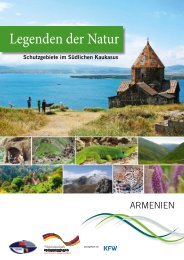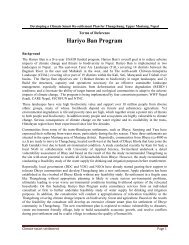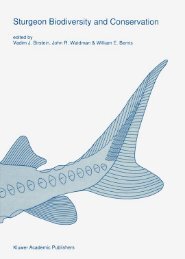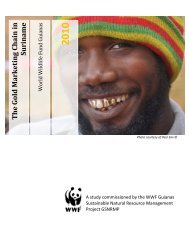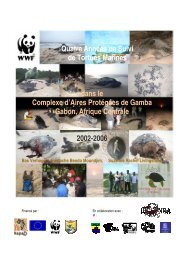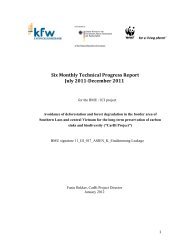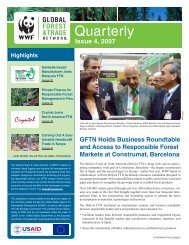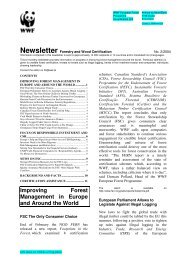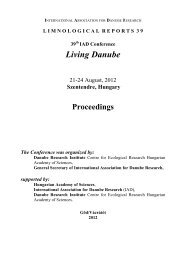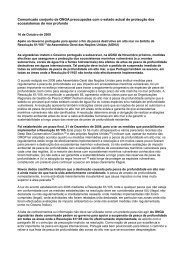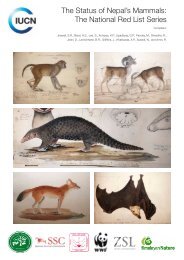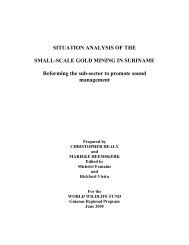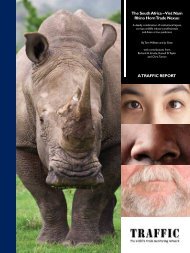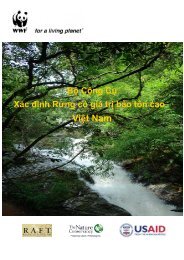Download the pdf - Global Footprint Network
Download the pdf - Global Footprint Network
Download the pdf - Global Footprint Network
Create successful ePaper yourself
Turn your PDF publications into a flip-book with our unique Google optimized e-Paper software.
12<br />
Executive summary<br />
In <strong>the</strong> Heart of<br />
Borneo, an average<br />
of 850,000 hectares<br />
of forest is lost every<br />
year due to palm oil<br />
plantations, mining<br />
and timber production<br />
agricultural yields, declining freshwater fish stocks, and reduced access<br />
to clean drinking water.<br />
One of <strong>the</strong> most widely used indicators for tracking <strong>the</strong> state of<br />
biodiversity around <strong>the</strong> world is <strong>the</strong> Living Planet Index (LPI), which<br />
can be regarded as an indicator of <strong>the</strong> health of <strong>the</strong> planet’s ecosystems.<br />
Between 1970 and 2008 <strong>the</strong> global LPI fell by almost 30%. In <strong>the</strong> Indo-<br />
Pacific region, <strong>the</strong> LPI shows an even greater decline of 64% in key<br />
populations of species over <strong>the</strong> same period.<br />
This report looks in more detail at <strong>the</strong> state of key ecosystems in Asia<br />
and <strong>the</strong> Pacific and what can be done to sustain <strong>the</strong>m. In particular<br />
<strong>the</strong> report focuses on four major regions where cooperative action<br />
to safeguard ecosystem services and natural resources is making a<br />
difference: <strong>the</strong> Heart of Borneo, <strong>the</strong> Coral Triangle, <strong>the</strong> Greater Mekong<br />
Subregion and <strong>the</strong> Eastern Himalayas. In <strong>the</strong>se subregions, <strong>the</strong> web of<br />
ecosystems provides income and livelihoods for millions of people and<br />
is worth billions of dollars annually in exports and national income.<br />
The forested watersheds, biodiversity, and coastal and marine habitats<br />
also provide multiple services not currently valued in <strong>the</strong> marketplace<br />
or fully recognized by decision-making processes. As a result, changing<br />
consumption patterns and ever-growing demand for resources are<br />
putting <strong>the</strong>se ecosystems under extreme pressure.<br />
In <strong>the</strong> Heart of Borneo, an average of 850,000 hectares of forest is<br />
lost every year due to palm oil plantations, mining and timber<br />
production. If this trend continues, by 2020, forest cover will drop to<br />
less than a third of what it was in 1950. In <strong>the</strong> Coral Triangle, over<br />
40% of <strong>the</strong> coral reefs and mangroves of <strong>the</strong> region have disappeared<br />
over <strong>the</strong> last 40 years, resulting in declining fish stocks. In <strong>the</strong><br />
Greater Mekong Subregion, economic development jeopardizes <strong>the</strong><br />
connectivity between <strong>the</strong> important biodiversity hotspots in <strong>the</strong> region,<br />
and poorly planned hydropower projects could result in a drop in<br />
fish production of 150,000 to 480,000 tons per year in 2015<br />
compared to year 2000 levels.<br />
Increasingly however, governments, businesses and communities<br />
are working toge<strong>the</strong>r in <strong>the</strong>se areas to protect biodiversity and<br />
ecosystems, allowing countries to maintain and increase <strong>the</strong> economic<br />
and social benefits derived from <strong>the</strong>ir natural capital. In doing so,<br />
various approaches are emerging and show great promise in helping<br />
to maintain natural capital, while at <strong>the</strong> same time encouraging green<br />
growth and poverty alleviation. This report will explore a number of<br />
<strong>the</strong>se approaches, including experiences from four regional initiatives<br />
and programs: <strong>the</strong> Heart of Borneo Initiative (HoB), <strong>the</strong> Coral Triangle


